 The CMS is practicing what it preaches: The agency decided to open several large data sets for consumers, researchers and entrepreneurs to use.
The CMS is practicing what it preaches: The agency decided to open several large data sets for consumers, researchers and entrepreneurs to use.
The announcement was made at this week’s Health Datapalooza conference in Washington, which discusses the virtues of open data and transparency in the healthcare system.
For Medicare, the agency is releasing the 2012 edition of its inpatient and outpatient charge dataset. That updates its previous release of 2011 data and allows interested parties to trend or compare data year over year. For example, the agency says, total number of discharges for medical back problems declined 7% from 2011 to 2012. The dataset comprises the 100 most common inpatient stays at more than 3,000 hospitals.
Also, for Medicare, the agency is releasing a warehouse of data related to chronic conditions and another dataset concerning geographic variation. The chronic condition dataset includes spending and treatment data, such as the number of emergency room admissions for patients with a particular condition.
Niall Brennan, the acting director of the CMS’ Office of Enterprise Management, described the assembly of the chronic-condition dataset and an accompanying dashboard interface as being done “in house on a shoestring” to the audience of the Datapalooza conference. The dashboard, Brennan said, should allow for easy access and understanding to citizens of all types.
“It’s one thing to release a dataset that smart, data-literate people like yourselves can use,” he told the audience. It’s another, he said, to have “data democratization”—easy-to-understand data.
Separately, the Food and Drug Administration is releasing its long-discussed openFDA, which will make adverse event information relating to drugs available in a computer-readable format.
In a blog post accompanying the release, the agency’s chief health informatics officer, Taha Kass-Hout, said the tool should make it easier for citizens to access the nearly 3 million adverse-event reports made to the FDA since 2004.
“In the past, these vast datasets could be difficult for industry to access and use,” Kass-Hout wrote. “Pharmaceutical companies, for example, send hundreds of Freedom of Information Act requests to FDA every year.”
The dataset, available with an API, will allow developers to build tools that access the FDA’s information instantly, Kass-Hout said. He envisions, for example, mobile developers building tools to allow patients to access adverse-event reports to see if a particular effect from a drug is shared by others taking it.
The adverse-event data may be supplemented later with data on product recalls and labeling, the CMS said.
——————————————————
Prepare For The Medical Coding Certification Exam Here!
Originally published on: Modern Healthcare
Follow Medical Coding Pro on Twitter: www.Twitter.com/CodingPro1








This Post Has One Comment
Pingback: CMS Opens Vaults, Releases 2012 Medicare Charge Set | scrubs and suits
Comments are closed.